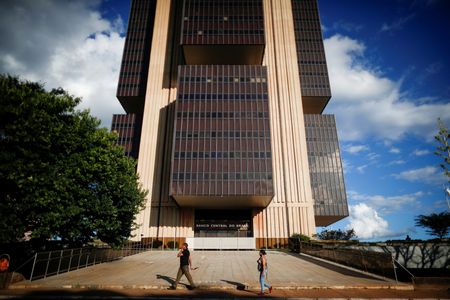BRASILIA (Reuters) -Brazil’s central bank already believes a recently proposed spending package is partly affecting closely watched inflation expectations, said the bank’s chief Roberto Campos Neto on Thursday.
Policymakers have highlighted inflationary risks arising from leftist President-elect Luiz Inacio Lula da Silva’s 168 billion reais ($31.5 billion) spending proposal to meet his campaign promises. The proposal has been approved in the Senate but has yet to be voted on in the lower house.
Campos Neto told a news conference that policymakers remain vigilant in assessing fiscal policy changes, noting that their impact on the inflation expectations channel is what matters for policy decisions.
“We see a big increase in the market risk premium in the first place. Big. We see it in implicit inflation and in the structure of long-term interest rates and, when that happens, expectations are always contaminated,” he said, adding long-term inflation expectations were in part affected.
For its current inflation projections, the central bank has considered a fiscal expansion of 130 billion reais next year extracted from market estimates, said Campos Neto.
The central bank held interest rates at 13.75% this month, after a September pause to an aggressive tightening that lifted rates from a 2% record low in March 2021 to battle inflation.
Faced with expected pressure on the public debt due to booming expenses, economists have taken a more conservative stance on when rate cuts would begin in Latin America’s largest economy, with some predicting hikes to be even resumed next year.
Campos Neto pointed out that coordination between fiscal and monetary policies is “very important,” and the central bank needs proper conditions to lower rates.
He also said that returns to sizeable subsidized credit would negatively impact the neutral interest rate and reduce monetary policy power, praising the TLP rate as an “institutional gain” that helped the capital markets expansion.
The TLP was implemented in 2018 to bring the cost of state-run development bank BNDES lending rates in line with those of the market. The government transition team recently said it is too high and should be reformed.
($1 = 5.3405 reais)
(Reporting by Marcela Ayres; Editing by Steven Grattan and Josie Kao)

